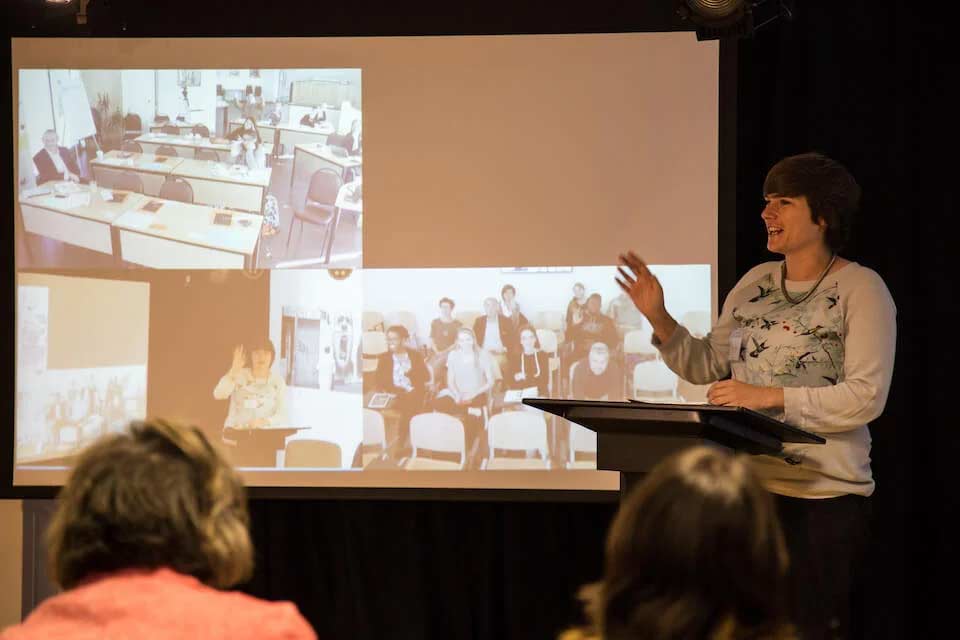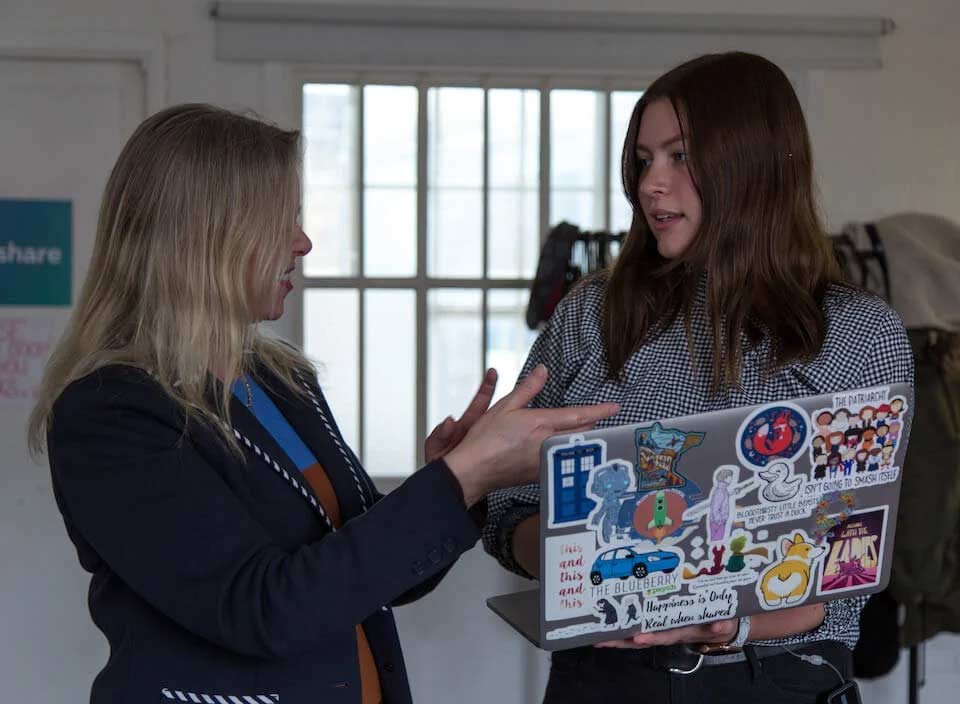CEA CAPA has invested in state-of-the-art communications technology that allows for video conferencing across classrooms and transforms traditional brick-and-mortar academic centers into virtual Global Classrooms across each of our locations. This technology enables students to meet and attend class sessions in real time, view recorded content to access at a later time, and engage in collaborative and comparative analysis of the topics being studied. This technology was originally implemented in our CEA CAPA courses on our Global Cities programs, but with the many pivots of the past few years, it has increasingly become a highly useful and desirable element of custom programming as well.

An example of Globally Networked Learning technology in a CEA CAPA classroom.
Connecting classrooms through technology enables students to collaborate and communicate across borders with students in other locations and across the globe, expanding opportunities for comparative global studies. This mechanism also creates the potential to link with classrooms in universities to bring international dialogues into the US classroom. In this way, we can go beyond teaching about globalization to teaching globally.
In this article, we share two examples of custom programs with CEA CAPA that were designed to incorporate Globally Networked Learning technology to enhance the curricular goals of the program.
-
Connecting with the Home Campus
University of Utah - Eccles School of Business in London
The University of Utah Eccles School of Business is one of the first CEA CAPA custom programs to have implemented Globally Networked Learning technology as part of the program design. Students spend the Fall semester at CEA CAPA London, and are actively involved in CEA CAPA London inclusions, including housing, excursions, and CEA CAPA's My Global City calendar. Eccles students enroll in up to five Eccles-taught courses throughout the program, which are taught remotely in a Global Classroom at the CEA CAPA London Center. To round out the curriculum, students take one culture course taught by a CEA CAPA London faculty member, which allows students to connect with the local culture and engage with London as their classroom.
Eccles faculty visit the London program at strategic times throughout the program for one week to teach in-person and check in with their students. This model allows students to remain full-time Eccles students while on the program, generates a sense of community and belonging for the Eccles cohort in London, and reduces the student program fees by not including faculty costs for the full semester. Faculty remain available to teach other courses at the home campus in Utah, enjoy an opportunity to visit and teach for a brief period of time in London, and can focus on academics and let CEA CAPA support the health & safety and cultural engagement aspects of the program.
Learn more about the student perspective of the Eccles London program »

CEA CAPA's innovative use of technology in the classroom allows students on both Global Cities and custom programs to experience unique learning opportunities.
-
Connecting across CEA CAPA Locations
Spelman College in Florence and Barcelona
Spelman College is a leader in campus internationalization for their innovative faculty-led programming that promote participation and learning from both students and faculty. CEA CAPA hosts two identical programs for Spelman in Barcelona and Florence that run concurrently each summer. The programs enroll students and Spelman faculty in a customized CEA CAPA-taught course about Globalization that utilizes Spelman faculty as group leaders and discussion facilitators. The course includes a Globally Networked Learning activity in which students engage with their counterparts in the other CEA CAPA global city to enhance their understanding of globalization transnationally. For example, in class discussions and group projects, students are asked to compare what makes their city a global city; how the national identities are formed across Italy and Spain; and ways in which the tourist gaze affects the urban landscape.
The courses utilize Globally Networked Learning technology by providing an assignment in which Spelman students from one program work on a group project with students from the cohort in the other CEA CAPA location. Here is an example of a GNL assignment:
Students will upload an image onto a shared Google Map that represents their city to them. Following this, each CEA CAPA location will compare and contrast each location's perceptions of their host cities. Students will then be divided into research groups concerning issues relating to all the cities such as art, food and markets, ethnicity, etc. These international student groups will then collaborate and create a shared Google Doc and present their group's findings in class. The presentation should include a shared comparative analysis of the topic.
Students develop valuable professional skills as they work together on multinational projects with faculty and students across CEA CAPA locations. This model allows them to learn how to effectively communicate virtually across time zones, national boundaries, and interpersonal barriers. Students also learn important group collaboration skills and develop powerful strategic thinking skills.
Interested in exploring a program that utilizes Globally Networked Learning for a CEA CAPA custom program with your home institution? Contact our team to get the conversation started.
Emily Resnevic is the Senior Custom Program Developer.
Leave a comment